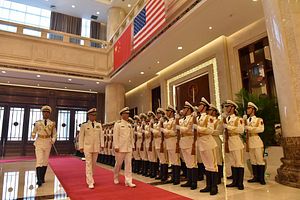The commander of the People’s Liberation Army Navy (PLAN), Admiral Wu Shengli, told Chinese state-run media that China is ready to counter any infringement of the country’s perceived rights and any aggression in the South China Sea.
“The Chinese navy is prepared to react to any infringement of rights or aggression … Efforts to force us to succumb to pressure will only be counterproductive,” Wu said on CCTV, the South China Morning Post reports.
The admiral’s remarks occurred during a three-day visit to China by the U.S. Navy’s chief of naval operations (CNO), Admiral John Richardson. It is the CNO’s first official visit to China and the first time he and his Chinese counterpart have met in person.
Coinciding with the official visit, China’s Maritime Safety Agency announced yet another military exercise off the coast of Hainan Island from July 19-21. China cordoned off an area for the naval drills, advising civilian ships that entering the cordoned off zone is prohibited.
During a meeting on Monday in Beijing between the two admirals, Wu also stressed that China will continue its construction program in the South China.
“We will never stop our construction on the Nansha [Spratlys] Islands halfway… the Nansha Islands are China’s inherent territory, and our necessary construction on the islands is reasonable, justified, and lawful,” Wu said, according to Xinhua News Agency.
“We will never sacrifice our sovereignty and interests in the South China Sea,” the admiral noted, emphasizing that the South China Sea is a “core interest” of the China which the “[Communist] Party’s governance, the country’s security and stability and the Chinese nation’s basic interests” depend upon, as Xinhua paraphrased Wu’s remarks.
“Any attempt to force China to give in through flexing military muscles will only have the opposite effect,” the admiral emphasized.
Wu also expressed his wish for both navies and air forces to follow the Code for Unplanned Encounters at Sea (CUES) and the Rules of Behavior for the Safety of Air and Maritime Encounters. Over the last couple of months, a number of “unsafe” intercepts occurred when Chinese fighter jets tried to intercept U.S. military aircraft in international airspace in both the South and East China Seas.
“I thought the discussions were very open and broad in scope and very honest. We really covered the entire spectrum of our relationship – from those areas where our cooperation and collaboration is doing very well, such as participation in RIMPAC, areas such as port visits, areas such as use of the CUES arrangement to regulate our encounters at sea and keep them safe and professional,” Richardson said in an audio statement, according to USNI News.
“We highlighted how useful and beneficial those areas [are] but on the other hand we didn’t dodge the more contentious issues, the more solemn issues as the Chinese would say, regarding disposition in the South China Sea, the recent court of arbitration ruling and those issues as well, recognizing that it’s only through being completely frank and honest that we’re going to make any kind of progress on these areas,” he added. “Both of us recognize it’s an extremely important relationship and that the navy to navy part of that relationship bears a great responsibility to make sure that we get to our mutual benefit.”
Wu also stressed that cooperation between the two navies is “the only correct option.” The U.S. admiral will travel next to Qingdao, home of the Chinese North Sea Fleet, where he is scheduled to visit the PLAN’s submarine academy and tour the aircraft carrier Liaoning.

































